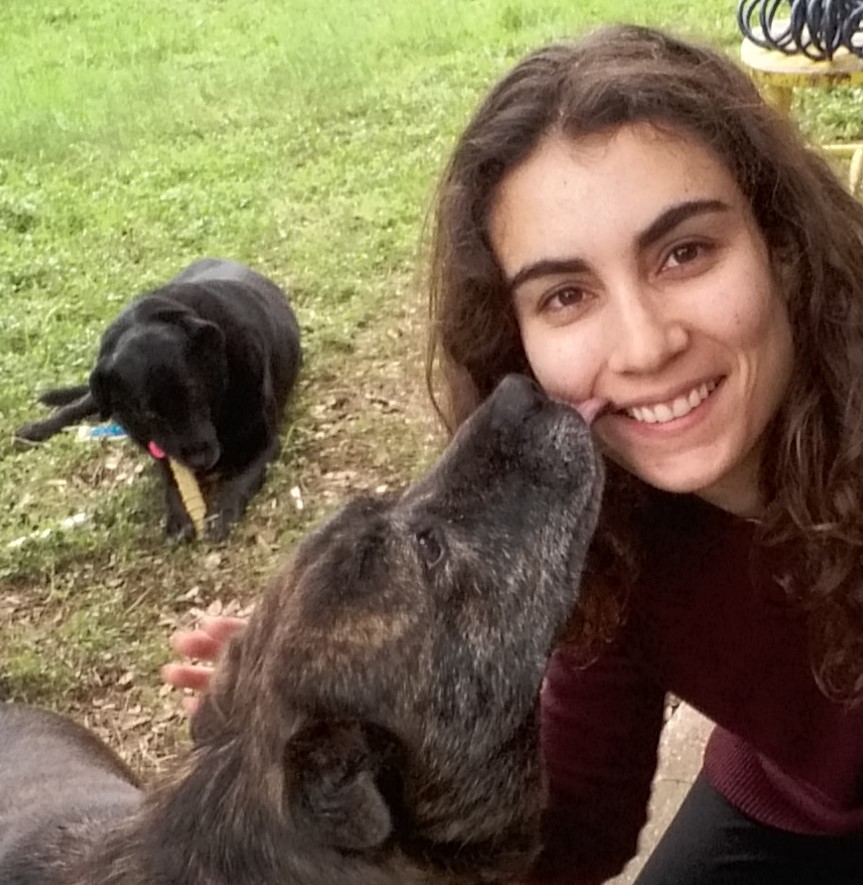
[et_pb_section fb_built="1" admin_label="section" _builder_version="3.0.47" custom_padding="54px|0px|0px|0px"][et_pb_row admin_label="row" _builder_version="3.0.47" background_size="initial" background_position="top_left" background_repeat="repeat"][et_pb_column type="4_4" _builder_version="3.0.47" parallax="off" parallax_method="on"][et_pb_text admin_label="Text" _builder_version="3.0.47" background_size="initial" background_position="top_left" background_repeat="repeat"]
As dogs grow older, their needs may change. A healthy, balanced diet and appropriate exercise are essentialto keep up with their changing needs and provide them with the quality of life they deserve. But what is a senior dog, after all?
Seniority in dogs depends on their life expectancy, which is associated with their size and breed. Giant dog breeds are considered to reach seniority at around 6 years old, as their life expectancy usually does not go beyond 8 or 9 years. Smaller dog breeds, on the other hand, reach old age later. A senior Poodle, for example, would be considered a senior dog at around 14 or 15 years old.
Older dogs are usually less active and have a slower metabolism, which makes them less efficient when metabolizing the food they eat. That is why many senior dogs tend to put on weight and some even become obese. However, many other dogs maintain their vitality and good shape during their last years. If a dog’s weight and body condition are good, there is no reason to change a diet that is working well.
[/et_pb_text][et_pb_image src="https://vetnaturals.com/wp-content/uploads/2017/06/pic4.png" align="center" _builder_version="3.0.47" animation_style="slide" animation_direction="left" animation_duration="500ms" animation_intensity_slide="10%"][/et_pb_image][et_pb_text admin_label="Text" _builder_version="3.0.47" background_size="initial" background_position="top_left" background_repeat="repeat"]
When health issues arise, though, the diet should be adjusted to account for the imbalances that are taking place, thus helping to halt the progression of the disease. Dogs with kidney problems should have diets with lower protein content and proteins should be highly digestible; dogs with heart disease should have reduced sodium content in their diets; dogs with constipation problems should have diets with 3 to 5% more fiber; and dogs with cognitive impairment or dementia should take supplements, such as fish oil.
A good diet should be aimed for at any stage of a dog’s life, as it is one of the most important factors determining their health status. That is no different in a senior dog. A proper diet for a senior dog should have good quality protein from an animal source, and not a plant source, and its content should be high, as protein helps maintaining muscle tone, wound healing, supporting the immune and nervous system, and keeping a healthy skin and coat. A common misconception is that older dogs should be on diets with lower protein content, as they help protect kidney and liver function. This is false. Lack of protein may lead to higher susceptibility to stress and muscle wasting, as the body will start using its own muscle to compensate for the protein deficiency. In fact, because older dogs may have trouble metabolizing nutrients, including protein, its content should be high, to make sure they get enough of it.
[/et_pb_text][et_pb_image src="https://vetnaturals.com/wp-content/uploads/2017/06/pic1-1.jpg" align="center" _builder_version="3.0.47" animation_style="slide" animation_direction="left" animation_duration="500ms" animation_intensity_slide="10%"][/et_pb_image][et_pb_text admin_label="Text" _builder_version="3.0.47" background_size="initial" background_position="top_left" background_repeat="repeat"]Carbohydrates are not needed in a dog’s diet. Period. Be it a puppy, an adult dog, or a senior dog, carbohydrates will lead to inflammation, obesity, and maldigestion. Because an older dog may have more trouble metabolizing carbohydrates than a younger dog, the consequences of their consumption are more evident. Inflammation increases arthritis and all types of degenerative diseases, such as cognitive dysfunction (or dementia). Therefore, owners should always aim for a diet with no carbohydrates (excluding fiber, which are indigestible carbohydrates that are beneficial for digestive health).
[/et_pb_text][et_pb_image src="https://vetnaturals.com/wp-content/uploads/2017/06/pic3.jpeg" align="center" _builder_version="3.0.47" animation_style="slide" animation_direction="left" animation_duration="500ms" animation_intensity_slide="10%"][/et_pb_image][et_pb_text admin_label="Text" _builder_version="3.0.47" background_size="initial" background_position="top_left" background_repeat="repeat"]
Excess weight in senior dogs should be controlled by feeding the dog less food and limiting the fat content of his or her diet. However, diets with a low content of fat will leave the dog feeling hungry all the time, which will affect his quality of life. Moreover, fats are needed to keep their skin and coat looking great, they strengthen the immune system, and they play a paramount role in transporting fat-soluble vitamins (vitamins A, D, E, and K). So, when trying to reduce fat content, owners should look for moderately reduced fat content (10 to 14% for dry foods), and not low.
Supplements are also a key component of a senior dog’s dietary plan. They have huge benefits, aiding in the control of specific conditions, but also in the general support of the immune system, which in turn strengthens the dog’s overall ability to fight off disease. Glucosamine and chondroitin are proved to contribute to the health of joints and halt the progression of arthritis; fish oil helps supporting brain function and also healthy joints; turmeric has anti-inflammatory properties that help preventing degenerative disease; anti-oxidants, such as CoQ10, alpha-lipoic acid, vitamins C, E, and A, beta-carotene, and selenium all have beneficial roles in the aging systems of a senior dog, particularly the brain and heart.
[/et_pb_text][et_pb_image src="https://vetnaturals.com/wp-content/uploads/2017/06/pic2.jpg" align="center" _builder_version="3.0.47" animation_style="slide" animation_direction="left" animation_duration="500ms" animation_intensity_slide="10%"][/et_pb_image][et_pb_text admin_label="Text" _builder_version="3.0.47" background_size="initial" background_position="top_left" background_repeat="repeat"]
All things considered, old dogs are just like any other dog. Good quality food, exercise, adapted to his or her specific needs and health status, correct body weight, supplementation, good veterinary care, and lots of love are what make up a healthy, happy dog.
If you’re looking for a supplement to support your senior dog’s hips, joint, digestion, skin & coat or overall better health, check out Veterinary Naturals line of natural, organic and hemp based supplements.
You can find our Probiotic-supplement here :
[/et_pb_text][et_pb_image src="https://vetnaturals.com/wp-content/uploads/2017/04/chewy-btn-150.png" url="https://www.chewy.com/veterinary-naturals-hemp-health/dp/152768" url_new_window="on" _builder_version="3.0.47" animation_style="slide" animation_direction="left" animation_duration="500ms" animation_intensity_slide="10%" custom_css_main_element="float:left;||margin-right:30px;"][/et_pb_image][et_pb_image src="https://vetnaturals.com/wp-content/uploads/2017/04/amazon-btn-150.png" url="https://www.amazon.com/Veterinary-Naturals-Health-Probiotic-Supplement/dp/B06XTBV8SX/ref=pd_sim_199_2?_encoding=UTF8&psc=1&refRID=3YR5M95DHGB1VS2PZM6K" url_new_window="on" _builder_version="3.0.69" animation_style="slide" animation_direction="left" animation_duration="500ms" animation_intensity_slide="10%"][/et_pb_image][et_pb_text admin_label="Text" _builder_version="3.0.47" background_size="initial" background_position="top_left" background_repeat="repeat"]These supplements are designed with the older dog in mind:
[/et_pb_text][et_pb_image src="https://vetnaturals.com/wp-content/uploads/2017/04/amazon-btn-150.png" url="https://www.amazon.com/dp/B06ZYSPJF6" url_new_window="on" _builder_version="3.0.47" animation_style="slide" animation_direction="left" animation_duration="500ms" animation_intensity_slide="10%"][/et_pb_image][et_pb_image _builder_version="3.0.47" animation_style="slide" animation_direction="left" animation_duration="500ms" animation_intensity_slide="10%"][/et_pb_image][/et_pb_column][/et_pb_row][/et_pb_section]


